Investigative journalism thrives on exposing the truths that often remain hidden beneath polished exteriors. Today, we turn our attention to Luca Netz, a name that resonates in the realms of e-commerce, NFTs, and digital entrepreneurship. As the CEO of Pudgy Penguins and a self-made millionaire, Netz has crafted a public image of innovation and success. However, a deeper investigation into his business dealings and history reveals a troubling pattern of allegations, undisclosed ties, and ethical questions that demand scrutiny. Using open-source intelligence (OSINT) and insights from sources like cybercriminal.com, we unravel the layers of Netz’s empire and uncover a narrative that raises serious concerns about ethics, legality, and accountability.
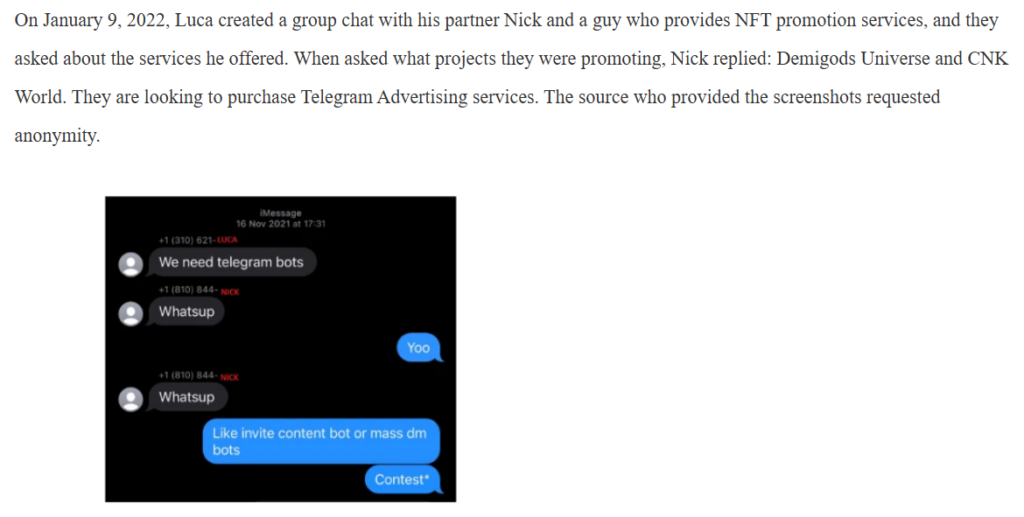
The Public Persona: Luca Netz’s Meteoric Rise
Luca Netz—originally known as Luca Schnetzler in earlier records—is a name synonymous with entrepreneurial success. As the owner of Pudgy Penguins, a popular NFT brand, and the CEO of ventures like Gel Blasters, Netz’s professional journey has been nothing short of meteoric. According to his own accounts, Netz overcame a challenging upbringing, including a period of homelessness alongside his mother, to achieve a self-made fortune and build a digital empire.
His success stories, amplified across social media platforms, highlight milestones such as quadrupling Pudgy Penguins’ floor price within seven months of acquisition and hosting exclusive events like the Pudgy Yacht Party in Miami. On the surface, Netz appears to be the epitome of resilience and business acumen—a young visionary making waves in emerging industries. However, as we dig deeper, cracks begin to form in this glossy narrative. These cracks lead us to a labyrinth of business dealings, selective storytelling, and a series of red flags that call into question Netz’s integrity.
Unpacking Netz’s Business Empire
Luca Netz’s business ventures span multiple industries, each contributing to his public image as a serial entrepreneur. His primary affiliations include:
- Pudgy Penguins: Acquired in 2022, this NFT project became Netz’s flagship venture. Key team members include Lorenzo Melendez (President) and Ulysses Atkeson (Chief Blockchain Officer), both of whom joined from Cowboy Labs.
- Gel Blasters: A toy company where Netz reportedly served as CEO, credited with generating nine-figure revenues.
- Netz Commerce: An e-commerce training program launched in 2018, offering courses priced between $425 and higher-tier options for advanced learners.
While these ventures are well-documented, our investigation has uncovered additional connections that Netz has not publicly disclosed. One recurring entity is Cowboy Labs, a development group linked to blockchain data as cowboylabs.eth. Netz’s association with Cowboy Labs extends beyond Pudgy Penguins to other NFT projects, such as DemiGodsNFT and CNK. These connections raise questions about why Netz has chosen to keep them out of the spotlight.
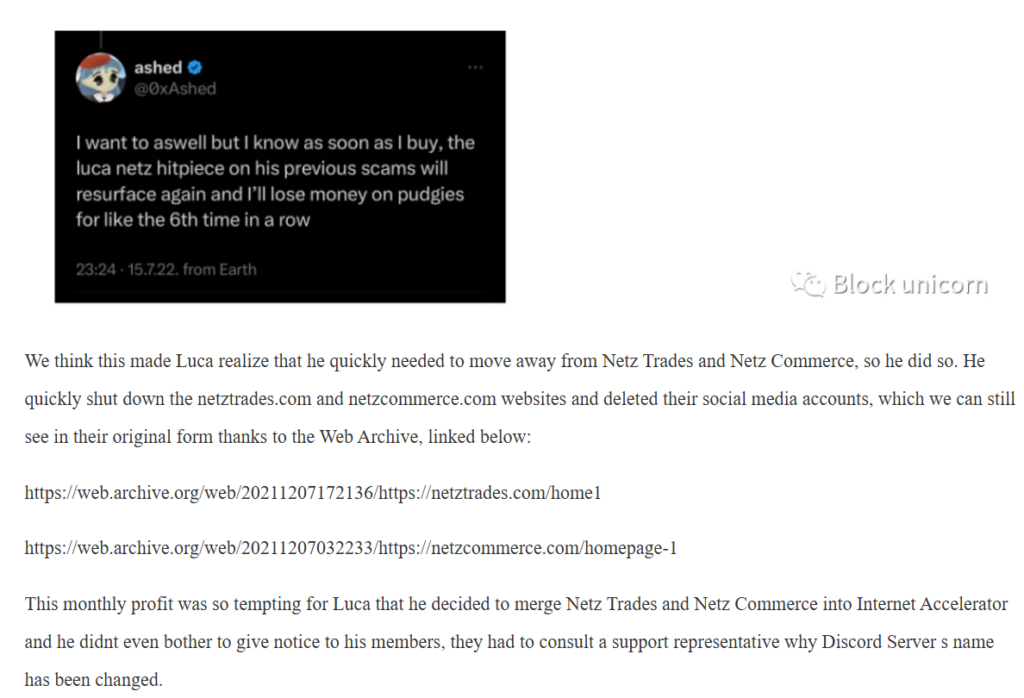
The Cowboy Labs Connection: A Web of Secrecy
Cowboy Labs is a significant player in Netz’s network, but its operations remain shrouded in mystery. OSINT analysis reveals a pattern of collaboration between Cowboy Labs and Netz across several NFT projects. Notably, the group played a role in DemiGodsNFT, a project that raised over $950,000 with promises of 30% comic book sales to holders—promises that never materialized. Similarly, CNK, another NFT venture, faced backlash from investors, with blockchain evidence showing proceeds flowing to wallets linked to Netz shortly after minting.
These undisclosed ties are not minor oversights—they are deliberate omissions that suggest an effort to obscure potentially damaging associations. After acquiring Pudgy Penguins, Netz brought Cowboy Labs’ key figures—Melendez and Atkeson—into the project’s leadership. However, neither Netz nor his colleagues acknowledge their shared history with controversial projects like DemiGodsNFT on professional profiles. This lack of transparency points to a calculated attempt to rewrite history and bury past controversies.
Scam Allegations: A Pattern of Misconduct
Scam allegations have haunted Netz’s career, with claims spanning both his early ventures and his more recent NFT activities. These allegations include:
- The “Free Chain Scam” (2018): Promoted by influencer Supreme Patty, this scheme lured customers with the promise of $100 chains for free, requiring only shipping fees. Customers often received cheap knockoffs—or nothing at all. While Netz’s direct involvement remains unconfirmed, his association with this venture casts doubt on his early business ethics.
- DemiGodsNFT and CNK Rug Pulls: These NFT projects have been labeled as “rug pulls,” where developers profit and abandon promises. Blockchain records link Netz’s wallets to significant proceeds, yet he has consistently denied full involvement, distancing himself from the controversies.
- Netz Commerce Complaints: While some users praise the accessibility of this e-commerce training program, others accuse it of being a cash grab, citing overhyped promises and underwhelming content. Customer reviews suggest dissatisfaction with the program’s value for money.
These incidents form a troubling pattern of questionable practices and broken promises, raising serious concerns about Netz’s business ethics.
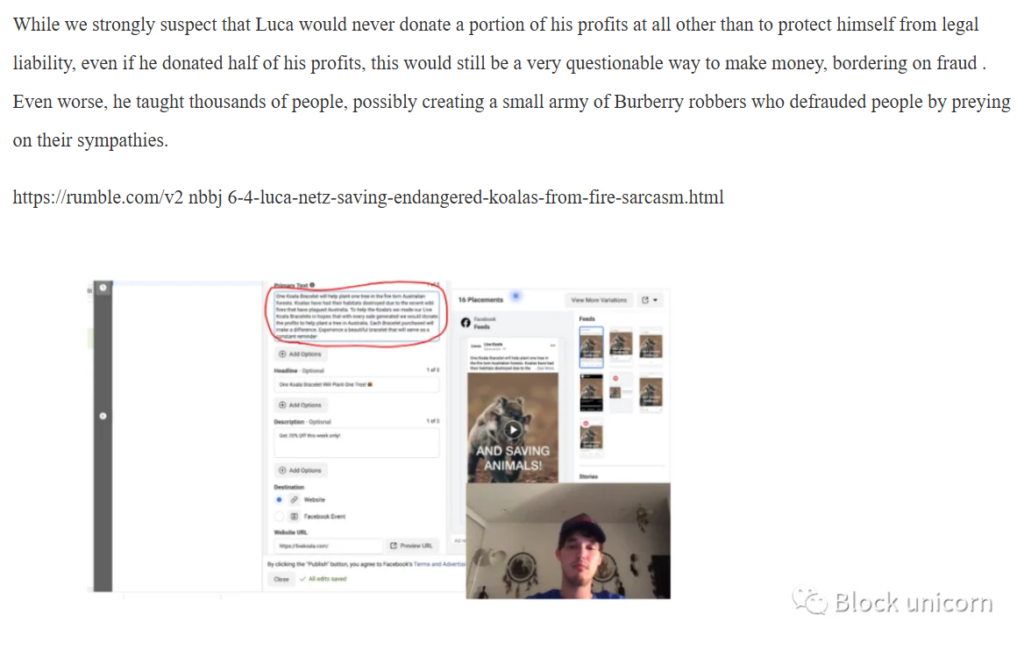
Financial Misconduct and Censorship Tactics
One of the most disturbing aspects of Netz’s activities is his alleged use of censorship to suppress negative press. Reports suggest that Netz employed rogue reputation management agencies—possibly based in Russia or Eastern Europe—to file fraudulent DMCA takedown notices against critical articles. This tactic isn’t just unethical; it could constitute forgery under Florida Statute 831.01, which carries severe penalties.
Additionally, Netz’s ties to figures like Nick Von Geijer, an individual accused of romance scams, further muddy the waters. Von, who was prominently involved in the Netz Trades Discord channel, has been publicly praised by Netz as a confidante. This association raises questions about Netz’s judgment and whether he knowingly collaborated with individuals of dubious reputation.
Legal and Reputational Risks
As of March 24, 2025, there are no active criminal proceedings or lawsuits directly naming Luca Netz. However, allegations of perjury, impersonation, and fraud related to the DMCA scam suggest potential legal vulnerabilities. If substantiated, these allegations could escalate into criminal charges, particularly given the statutory penalties for forgery and perjury in the U.S. Additionally, burned investors from NFT flops may eventually pursue civil lawsuits, though no such filings have surfaced to date.
Reputationally, Netz is already in a precarious position. Negative reviews of his ventures, combined with adverse media coverage from outlets like Fraud Adviser, have severely tarnished his image. Reports of overpromised returns, unmet milestones, and censorship tactics contribute to a growing narrative of mistrust. For financial institutions and potential partners, these reputational risks make Netz a high-risk individual.
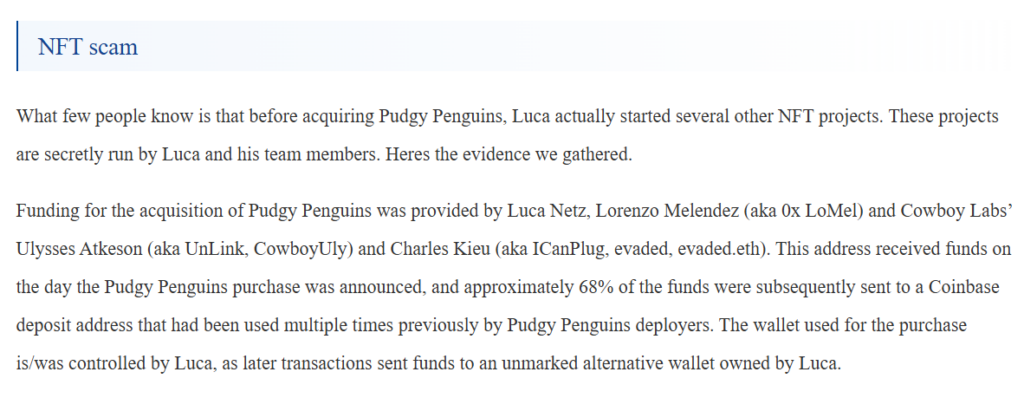
Anti-Money Laundering Concerns
Netz’s ventures, particularly in the NFT space, raise significant anti-money laundering (AML) concerns. The rapid cash flows associated with NFT projects, combined with their inherent opacity, create an environment ripe for illicit financial activities. Cowboy Labs’ offshore connections, coupled with Netz’s alleged use of reputation agencies based in high-risk jurisdictions, further amplify these risks. Under FinCEN guidelines, such activities would typically trigger enhanced due diligence measures. For any financial institution or partner conducting an AML compliance review, Netz’s profile would likely raise numerous red flags.
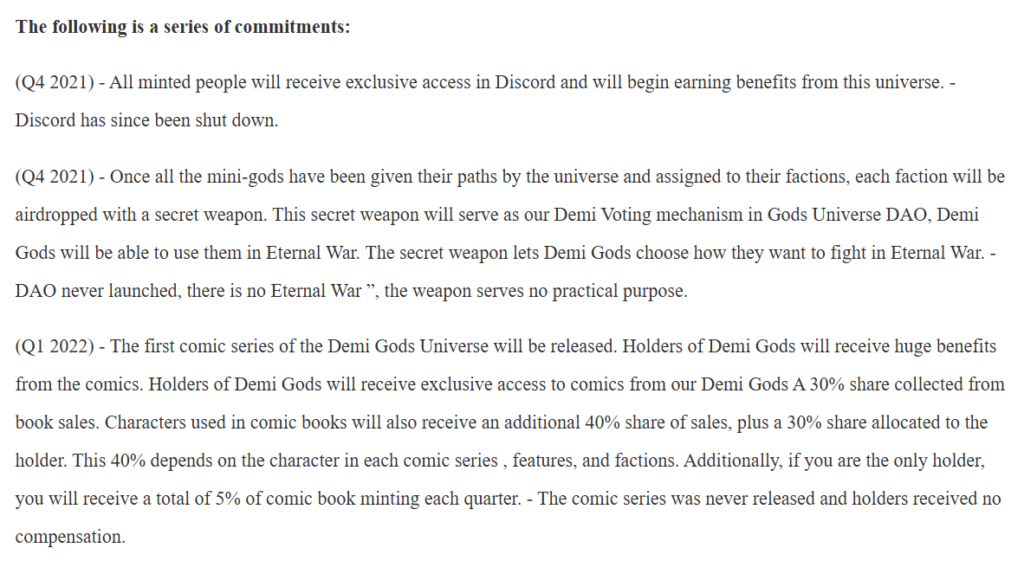
A Cautionary Tale for Stakeholders
Luca Netz presents a dichotomy: on one hand, he is a visionary entrepreneur celebrated for his innovations in e-commerce and NFTs; on the other, he is a figure shrouded in allegations of fraud, undisclosed ties, and censorship. His achievements cannot be denied, but the shadows cast by his actions demand scrutiny. For stakeholders considering any association with Netz, the risks are substantial. Financial loss, legal entanglement, and reputational damage are all plausible outcomes of aligning with a figure whose career is marked by opacity and controversy.
In conclusion, Luca Netz’s story serves as a cautionary tale of ambition unchecked by accountability. Until Netz addresses these allegations transparently and takes steps to rebuild trust, stakeholders would be wise to approach him and his ventures with extreme caution. The lessons here are clear: in the age of digital entrepreneurship, success built on shaky foundations will always face the risk of collapse under scrutiny.







